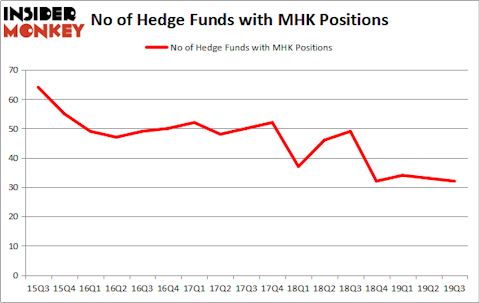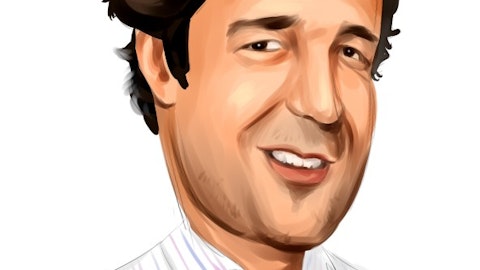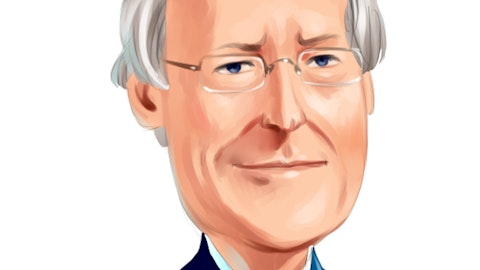Last year’s fourth quarter was a rough one for investors and many hedge funds, which were naturally unable to overcome the big dip in the broad market, as the S&P 500 fell by about 4.8% during 2018 and average hedge fund losing about 1%. The Russell 2000, composed of smaller companies, performed even worse, trailing the S&P by more than 6 percentage points, as investors fled less-known quantities for safe havens. Luckily hedge funds were shifting their holdings into large-cap stocks. The 20 most popular hedge fund stocks actually generated an average return of 37.4% in 2019 (through the end of November) and outperformed the S&P 500 ETF by 9.9 percentage points. We are done processing the latest 13F filings and in this article we will study how hedge fund sentiment towards Mohawk Industries, Inc. (NYSE:MHK) changed during the first quarter.
Mohawk Industries, Inc. (NYSE:MHK) has seen a decrease in enthusiasm from smart money lately. Our calculations also showed that MHK isn’t among the 30 most popular stocks among hedge funds (click for Q3 rankings and see the video below for Q2 rankings).

Video: Click the image to watch our video about the top 5 most popular hedge fund stocks.
Hedge funds’ reputation as shrewd investors has been tarnished in the last decade as their hedged returns couldn’t keep up with the unhedged returns of the market indices. Our research has shown that hedge funds’ small-cap stock picks managed to beat the market by double digits annually between 1999 and 2016, but the margin of outperformance has been declining in recent years. Nevertheless, we were still able to identify in advance a select group of hedge fund holdings that outperformed the Russell 2000 ETFs by 40 percentage points since May 2014 (see the details here). We were also able to identify in advance a select group of hedge fund holdings that underperformed the market by 10 percentage points annually between 2006 and 2017. Interestingly the margin of underperformance of these stocks has been increasing in recent years. Investors who are long the market and short these stocks would have returned more than 27% annually between 2015 and 2017. We have been tracking and sharing the list of these stocks since February 2017 in our quarterly newsletter.

Boykin Curry of Eagle Capital
Unlike the largest US hedge funds that are convinced Dow will soar past 40,000 or the world’s most bearish hedge fund that’s more convinced than ever that a crash is coming, our long-short investment strategy doesn’t rely on bull or bear markets to deliver double digit returns. We only rely on the best performing hedge funds‘ buy/sell signals. We’re going to take a glance at the key hedge fund action encompassing Mohawk Industries, Inc. (NYSE:MHK).
Hedge fund activity in Mohawk Industries, Inc. (NYSE:MHK)
At Q3’s end, a total of 32 of the hedge funds tracked by Insider Monkey were bullish on this stock, a change of -3% from one quarter earlier. By comparison, 49 hedge funds held shares or bullish call options in MHK a year ago. With hedgies’ capital changing hands, there exists a select group of noteworthy hedge fund managers who were adding to their stakes substantially (or already accumulated large positions).

The largest stake in Mohawk Industries, Inc. (NYSE:MHK) was held by Eagle Capital Management, which reported holding $575.5 million worth of stock at the end of September. It was followed by Pzena Investment Management with a $236.1 million position. Other investors bullish on the company included FPR Partners, First Pacific Advisors, and Ariel Investments. In terms of the portfolio weights assigned to each position Cloverdale Capital Management allocated the biggest weight to Mohawk Industries, Inc. (NYSE:MHK), around 7.42% of its portfolio. Fir Tree is also relatively very bullish on the stock, earmarking 5.04 percent of its 13F equity portfolio to MHK.
Judging by the fact that Mohawk Industries, Inc. (NYSE:MHK) has witnessed a decline in interest from the aggregate hedge fund industry, it’s easy to see that there exists a select few fund managers that elected to cut their full holdings last quarter. Interestingly, Robert Bishop’s Impala Asset Management said goodbye to the biggest position of the “upper crust” of funds watched by Insider Monkey, comprising about $96.5 million in stock. Dmitry Balyasny’s fund, Balyasny Asset Management, also dropped its stock, about $19.5 million worth. These transactions are interesting, as total hedge fund interest dropped by 1 funds last quarter.
Let’s also examine hedge fund activity in other stocks – not necessarily in the same industry as Mohawk Industries, Inc. (NYSE:MHK) but similarly valued. We will take a look at Crown Holdings, Inc. (NYSE:CCK), Beyond Meat, Inc. (NASDAQ:BYND), Alnylam Pharmaceuticals, Inc. (NASDAQ:ALNY), and NICE Ltd. (NASDAQ:NICE). This group of stocks’ market valuations are similar to MHK’s market valuation.
| Ticker | No of HFs with positions | Total Value of HF Positions (x1000) | Change in HF Position |
|---|---|---|---|
| CCK | 42 | 1266913 | 7 |
| BYND | 17 | 92936 | 1 |
| ALNY | 29 | 779948 | -6 |
| NICE | 16 | 375883 | -3 |
| Average | 26 | 628920 | -0.25 |
View table here if you experience formatting issues.
As you can see these stocks had an average of 26 hedge funds with bullish positions and the average amount invested in these stocks was $629 million. That figure was $1523 million in MHK’s case. Crown Holdings, Inc. (NYSE:CCK) is the most popular stock in this table. On the other hand NICE Ltd. (NASDAQ:NICE) is the least popular one with only 16 bullish hedge fund positions. Mohawk Industries, Inc. (NYSE:MHK) is not the most popular stock in this group but hedge fund interest is still above average. Our calculations showed that top 20 most popular stocks among hedge funds returned 37.4% in 2019 through the end of November and outperformed the S&P 500 ETF (SPY) by 9.9 percentage points. Hedge funds were also right about betting on MHK as the stock returned 12.3% during the fourth quarter (through the end of November) and outperformed the market. Hedge funds were rewarded for their relative bullishness.
Disclosure: None. This article was originally published at Insider Monkey.





